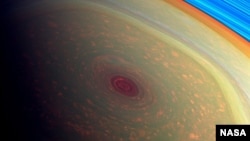Scientists have gotten their first close-up view of a monster hurricane swirling around Saturn’s north pole.
The storm, photographed by NASA’s Cassini spacecraft, measures about 2,000 kilometers wide, about 20 times bigger than an average hurricane on Earth. According to NASA, the thin clouds at the outermost of the storm are traveling at 150 meters per second.
One of the most notable qualities of the storm is that it is contained inside a six-sided weather pattern, or hexagon.
"We did a double take when we saw this vortex because it looks so much like a hurricane on Earth," said Andrew Ingersoll, a Cassini imaging team member at the California Institute of Technology in Pasadena in a statement. "But there it is at Saturn, on a much larger scale, and it is somehow getting by on the small amounts of water vapor in Saturn's hydrogen atmosphere."
While terrestrial hurricanes feed off of warm waters, the Saturn storm is fueled by water vapor. But like hurricanes here, the Saturn storm has an eye, an eye wall and high clouds spiraling around the eye. It also spins counter-clockwise in Saturn’s northern hemisphere.
While there many similarities with terrestrial hurricanes, one big difference is that the Saturn storm is locked onto the planet’s north pole.
"The polar hurricane has nowhere else to go, and that's likely why it's stuck at the pole," said Kunio Sayanagi, a Cassini imaging team associate at Hampton University in Hampton, Virginia.
The storm has probably been around for years, NASA said. But when Cassini arrived in 2004, the north pole was dark because it was winter in Saturn’s northern hemisphere. Still, Cassini was able to detect the vortex using the spacecraft’s composite infrared spectrometer. The storm was first spotted in visible light in 2009.
The storm, photographed by NASA’s Cassini spacecraft, measures about 2,000 kilometers wide, about 20 times bigger than an average hurricane on Earth. According to NASA, the thin clouds at the outermost of the storm are traveling at 150 meters per second.
One of the most notable qualities of the storm is that it is contained inside a six-sided weather pattern, or hexagon.
"We did a double take when we saw this vortex because it looks so much like a hurricane on Earth," said Andrew Ingersoll, a Cassini imaging team member at the California Institute of Technology in Pasadena in a statement. "But there it is at Saturn, on a much larger scale, and it is somehow getting by on the small amounts of water vapor in Saturn's hydrogen atmosphere."
While terrestrial hurricanes feed off of warm waters, the Saturn storm is fueled by water vapor. But like hurricanes here, the Saturn storm has an eye, an eye wall and high clouds spiraling around the eye. It also spins counter-clockwise in Saturn’s northern hemisphere.
While there many similarities with terrestrial hurricanes, one big difference is that the Saturn storm is locked onto the planet’s north pole.
"The polar hurricane has nowhere else to go, and that's likely why it's stuck at the pole," said Kunio Sayanagi, a Cassini imaging team associate at Hampton University in Hampton, Virginia.
The storm has probably been around for years, NASA said. But when Cassini arrived in 2004, the north pole was dark because it was winter in Saturn’s northern hemisphere. Still, Cassini was able to detect the vortex using the spacecraft’s composite infrared spectrometer. The storm was first spotted in visible light in 2009.
